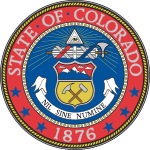| |||||||||||||||||||||||||||||
| |||||||||||||||||||||||||||||
 County Results
| |||||||||||||||||||||||||||||
| |||||||||||||||||||||||||||||
| Elections in Colorado |
|---|
 |
The 1896 United States presidential election in Colorado took place on November 3, 1896. All contemporary 45 states were part of the 1896 United States presidential election. Voters chose four electors to the Electoral College, which selected the president and vice president.
In its early days as a state, Colorado had like the Plains States to its east been solidly Republican. However, with crises emerging in its agricultural sector from low wheat prices[1] and a severe drought in 1888 and 1889,[2] and the state's underdevelopment leading to resentment of the Northeast,[3] the new Populist Party was able to largely take over the state's politics in the early 1890s. Aided by fusion with the minority Democratic Party and strong support for free silver in this state which produced over half of all American silver,[2] the Populist Party under James B. Weaver in 1892 carried the state's presidential electoral votes and won both its congressional seats.[2] After the Republicans gained a 130-seat majority in the House of Representatives following the 1894 elections, five dissident Republicans from the Mountain States who supported free silver jointed together as the “Silver Republicans”[a] They supported nominating Centennial State Senator Henry M. Teller for president at first, but ultimately this was viewed as impractical and the Silver Republicans fused with Democrat/Populist ticket headed by William Jennings Bryan.[4]
Bryan's support for free silver against the existing gold standard supported by Republican nominee William McKinley ensured he had virtually unanimous support from Colorado's silver-dependent business elite.[5] Once a fusion between Democrats, Populists, and Silver Republicans was fully finalized, there was no campaigning in Colorado as all polls showed Bryan would carry the state very easily.[6] Bryan, in the end, carried Colorado by a margin of 71.09%, by over twenty percent the best performance by any presidential candidate in the history of the state.[b][7] Bryan carried all but two of Colorado's counties, and won nineteen with over ninety percent of the vote, with McKinley retaining significant support only on the eastern High Plains, where the power of the silver magnates was much less.
With 84.95% of the popular vote, Colorado would prove to be Bryan's third strongest state in the 1896 presidential election only after Mississippi and South Carolina.[8]
Bryan would win Colorado against William McKinley again in 1900 and would later also win the state against William Howard Taft in 1908, making the state one of just two western states Bryan would carry in all three of his runs (the other being Nevada). This is the first election where the Republican candidate won without the state.
- ^ Gormley, Ken (editor); The Presidents and the Constitution: A Living History, p. 299 ISBN 1479839906
- ^ a b c Larson, Robert W.; ‘Populism in the Mountain West: A Mainstream Movement’; Western Historical Quarterly; Vol. 13, No. 2 (April 1982), pp. 143-164
- ^ Azari, Julia and Hetherington, Mark J.; ‘Back to the Future? What the Politics of the Late Nineteenth Century Can Tell Us about the 2016 Election’; The Annals of the American Academy of Political and Social Science; Vol 667: Elections in America; (September 2016), pp. 92-109
- ^ a b Ellis, Elmer; ‘The Silver Republicans in the Election of 1896’; The Mississippi Valley Historical Review, Vol. 18, No. 4 (March 1932), pp. 519-534
- ^ Phillips, Kevin P.; The Emerging Republican Majority, p. 458 ISBN 9780691163246
- ^ ‘Ready for the Vote: Campaign Now Closed in Nearly All States of the Union’; Baltimore Sun, November 2, 1896, p. 2
- ^ "Presidential General Election Results Comparison – Colorado". Dave Leip's U.S. Election Atlas.
- ^ "1896 Presidential Election Statistics". Dave Leip’s Atlas of U.S. Presidential Elections. Retrieved March 5, 2018.
Cite error: There are <ref group=lower-alpha> tags or {{efn}} templates on this page, but the references will not show without a {{reflist|group=lower-alpha}} template or {{notelist}} template (see the help page).


